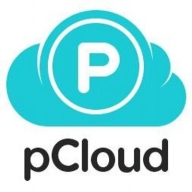

Nasuni and pCloud compete in the cloud storage solutions market, each offering distinct advantages. pCloud holds an advantage for users prioritizing security and flexible storage options, while Nasuni is preferable for enterprises needing robust collaboration tools.
Features: Nasuni provides efficient file synchronization and seamless collaboration tools tailored for enterprise use, integrating smoothly with business applications. pCloud focuses on advanced security measures, user-friendly storage management, and scalable storage plans, emphasizing client-side encryption and flexible storage solutions.
Room for Improvement: Nasuni could benefit from simplified deployment processes to reduce the initial IT resource demand and improve user accessibility for smaller teams. It might also enhance its user interface for more intuitive navigation and feature visibility. pCloud could enhance its enterprise-level functionalities to appeal to larger businesses and expand its file collaboration tools. Another improvement area could be the enhancement of customer support for more specialized business needs, providing more extensive integration options with third-party business applications.
Ease of Deployment and Customer Service: Nasuni uses a complex deployment model tailored for large enterprises, which may require dedicated IT resources for setup, complemented by strong customer support for extensive implementations. pCloud is recognized for its straightforward deployment, providing accessible support options suited for smaller teams and individual users, making it an attractive choice for those without extensive IT support.
Pricing and ROI: Nasuni has higher initial setup costs, offering substantial ROI for enterprises leveraging its full features and collaboration tools. pCloud boasts competitive pricing and lifetime storage options, providing a cost-effective solution optimized for individual and small business needs, prioritizing simplicity and security with options like 500 GB for $125 and 2 TB for $250 as lifetime offers.
| Product | Market Share (%) |
|---|---|
| Nasuni | 1.1% |
| pCloud | 0.7% |
| Other | 98.2% |

| Company Size | Count |
|---|---|
| Small Business | 3 |
| Midsize Enterprise | 8 |
| Large Enterprise | 24 |
| Company Size | Count |
|---|---|
| Small Business | 7 |
| Large Enterprise | 1 |
Nasuni is a file data services enterprise focused on assisting firms with their digital transformation, global expansion, and information awareness. The Nasuni File Data Platform is a suite of cloud-based services designed to enhance user productivity, ensure business continuity, provide data intelligence, offer cloud options, and simplify global infrastructure. This platform and its auxiliary services are projected to replace conventional file infrastructure such as network attached storage (NAS), backup, and Disaster Recovery (DR), with an expandable cloud-scale solution. By storing file data in scalable cloud object storage from multiple providers, Nasuni positions itself as a cloud-native alternative for traditional NAS and file server infrastructure. Based in Boston, Massachusetts, USA, Nasuni serves sectors like manufacturing, construction, technology, oil and gas, financial services, and public sector worldwide, offering its services in more than 70 countries.
James J., IT Manager at a marketing services firm, says Nasuni’s management dashboard is helpful because he's able to view all of the different filers at once rather than check each one of them individually. He values the software’s security, reliability, good performance, helpful alerting, and responsive support.
According to a Server Engineering Services Lead at a mining and metals company, Nasuni offers good OR and DR capabilities, performs well, offers data security, and continuous file versioning helps recover from hardware failures.
The Managing Director of IT at a construction company appreciates Nasuni because it eliminates a lot of work that was previously done when managing backing up and restoring data files.
pCloud is a personal cloud space where you can store all your files and folders. It has a user-friendly interface that clearly shows where everything is located and what it does. The software is available for almost any devices and platforms – iOS and Android devices, Mac, Windows, and Linux. By installing pCloud on your computer (through its desktop application pCloud Drive), the app creates a secure virtual drive which expands your local storage space. Every change you make in your pCloud can be seen immediately on your computer, phone or tablet. All your devices are instantly synchronized and you have direct file access to any update you make.
We monitor all Cloud Backup reviews to prevent fraudulent reviews and keep review quality high. We do not post reviews by company employees or direct competitors. We validate each review for authenticity via cross-reference with LinkedIn, and personal follow-up with the reviewer when necessary.